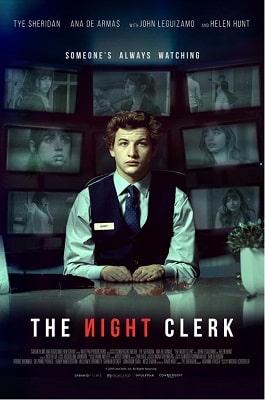Movie Review
The Night Clerk
reviewed by Matt Hayden
Mild spoilers ahead
The Night Clerk
Rating: R
Director: Michael Cristofer
Premiere Date (Theaters): Feb. 21, 2020
The Night Clerk is a 2020 American crime drama film starring Tye Sheridan, Ana De Armas, John Leguizamo, and Helen Hunt. The film focuses on Sheridan’s character who works as a night clerk in a local hotel and has Aspergers, making it difficult to have conversations with people and interact socially. This gives the actor an interesting element to work with over the course of the film and gives the audience a view as to how someone with this type of condition can live and create connections with others.
De Armas plays a hotel guest who is trying to create a connection with Sheridan for perhaps a nefarious reason as it does not make much sense to the viewer what would lead to the connection between these two people.
Sheridan witnesses a woman murdered in her hotel room through a set of cameras he has installed in the room in order for him to learn how people interact with one another—the aim of which is for him to be able to better copy others and improve his conversations, and to make friends.
Acting
The film—while lacking in plot—successfully gives us a well-acted character on the spectrum through Sheridan, and an interesting connection development between himself and De Armas. There is a worry whenever a film portrays a character who has a condition like Aspergers that they may end up overlooking key elements of the condition or give an inaccurate accounting. But here it was interesting to see how Sheridan portrayed Bart, with his use of cameras to learn how to interact with guest. Additionally well done was his development of an intense emotional connection, while not being aware of what he was doing being wrong and the continuous search for an identity. When interacting with someone similar to Bart it is possible for a person to view him as naive, unsophisticated, clueless, unfashionable and stupid—none of which are true, as can be noticed when he explains through monologues answers to rhetorical questions that another character asks.
It is through the connection between the leading pair that the film has its redeeming light. By having De Armas be shown as someone who understands Barts condition and is seemingly only interested in helping him to move to the next stage in his development, we get to see what their chemistry is like on screen. At times it can seem silly and very unrealistic, but the way in which they communicate and deal with issues feels very real to me for this type of scenario. This is only due to the great work being done by Sheridan to develop the characters condition to such an extent that we feel the emotional weight being borne by his mother living alone with her son. There is a scene where they eat together for what seems to be the first time in years, and I got a tear in my eyes, that is only thanks to the way in which Sheridan is able to convince the audience that there is something wrong with him.
But in saying all of that, the film has a simple issue at its core that is never explored in a way that provides closure to the audience. Bart had been spying on people in hotel rooms through the use of cameras and sound equipment. Yes, this was done for his benefit in improving social interactions, but it is illegal, an invasion of privacy, and plain wrong. But due to the nature of him being the protagonist, it is never discussed in a way that leads to repercussions, and the audience only knows if he feels remorse with a scene of him walking through a mall.
I can understand that the focus was on the condition and what he happened to witness on his cameras with the fact that he was left to try and figure out what it meant and how best to react. But by not showing actions having consequences, this film is only being saved by Sheridan, and De Armas to a smaller extent.







